Portland, Oregon
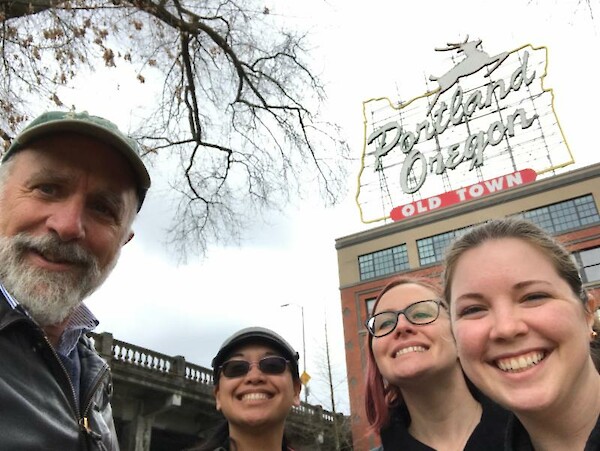
Bill Dennison, Katie May Laumann, Suzi Spitzer and Vanessa Vargas-Nguyen attended the Society for Applied Anthropology conference “Engaging Change in Turbulent Times” last month. Suzi organized a session on transdisciplinary science that included these topics: IAN as a boundary organization, integrating cultural and natural resources at National Parks, environmental report cards and citizen science. This conference was timely as IAN continues to journey into social sciences.
Quezon City, Phillipines
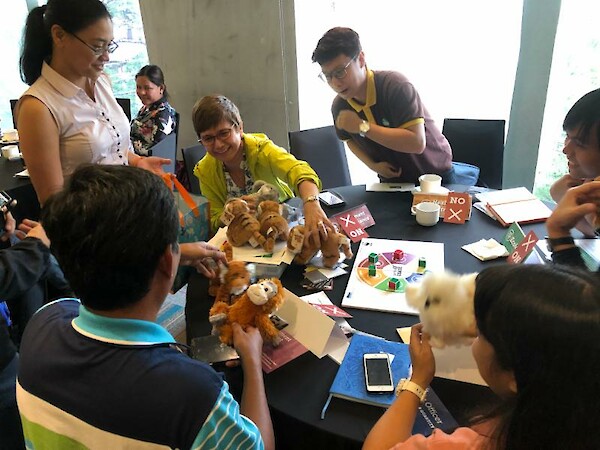
Vanessa facilitated the "Get the Grade" game to kick-start the German Corporation for International Cooperation (GIZ) and the Philippine Dept. of Env. and Natural Resources' project, "Eco-system-based Adaptation in 2 River Basins (E2RB)".
COAST Card project launched

Coastal Ocean Assessment for Sustainability and Transformation (or COAST Card) launched virtually and continues to move forward. This project is funded under the Belmont Forum Ocean Sustainability Collaborative Research Action (CRA).
Belmont Forum Newsletters released
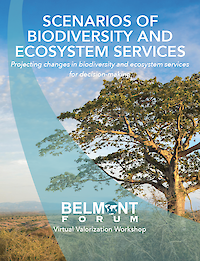
Convened by the Belmont Forum and facilitated by the University of Maryland Center for Environmental Science, the Belmont Tripartite Valorization workshop and Biodiversity I CRA virtual synthesis workshop served as the end term meeting for the Food Security and Land Use Change Collaborative Research Action (CRA), Biodiversity I CRA, and mid-term meetings for the Arctic Observing and Science for Sustainability and Mountains as Sentinels of Change CRAs. The Workshop reports, Understanding Responses to Global Change, and Scenarios of Biodiversity and Ecosystem Services, provide a brief overview of each project, identify common themes that emerged, and provide recommendations for future Belmont Forum Projects.
COAST Card international partnership continues to grow
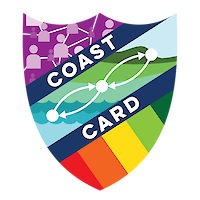
The Coastal Ocean Assessment for Sustainability and Transformation (COAST) Card is an international, transdisciplinary research program seeking to foster solutions to global sustainability challenges. This project brings together researchers from the USA, Japan, Philippines, Norway, and India. COAST Card merges three tools: socio-ecological network analyses; socio-environmental report cards; and system dynamics models. Email coastcard.research@gmail.com to subscribe to the newsletter, and follow COAST card on Twitter, Instagram, and LinkedIn.
Professional certificate opportunity and environmental management course now available online

On February 15, we launched our first professional certificate program in Environmental Management for Sustainability on EdX, an online learning platform for open online courses. Four courses make up the certificate. All courses are self-paced and available in five languages (English, Spanish, Filipino, Japanese, and Hindi). A professional certificate is available for verified learners, and all content is available for free. For more information, visit our certificate page on EdX.
COAST Card Research Consortium releases first newsletter
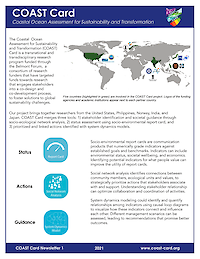
The Coastal Ocean Assessment for Sustainability and Transformation (COAST) Card is an international, transdisciplinary research program seeking to foster solutions to global sustainability challenges. This project brings together researchers from the USA, Japan, Philippines, Norway, and India. COAST Card merges three tools: socio-ecological network analyses; socio-environmental report cards; and system dynamics models. You can subscribe to the COAST Card e-news for updates. Follow COAST card on Twitter, Instagram, and LinkedIn.
Professional certificate opportunity and environmental management course now available online

On February 15, we launched our first professional certificate program in Environmental Management for Sustainability on EdX, an online learning platform for open online courses. Four courses make up the certificate. All courses are self-paced and available in five languages (English, Spanish, Filipino, Japanese, and Hindi). A professional certificate is available for verified learners, and all content is available for free. For more information, visit our certificate page on EdX.
Professional Certificate in Science for Environmental Management

UMCES is offering free online courses through EdX, a non-profit global provider of massive open online courses. Registration is now open! Certification for each course can be acquired through a small fee. Upon completing all four courses, students will earn a Professional Certificate in Science for Environmental Management. Communicating science effectively starts January 18, 2021. The other courses are: Developing socio-environmental report cards; Socio-environmental management; and Decision-making in socio-environmental management.
Kicking off the COAST Card project

IAN-UMCES led the kick-off activities of our Belmont Forum-funded project, COAST Card (Coastal Ocean Assessment for Sustainability and Transformation), through a series of virtual meetings in September and October. The meetings brought together partners from the USA, Norway, Japan, Philippines, and India. COAST Card integrates socio-environmental report cards, social network analysis, and system dynamics modeling in global locations: the Chesapeake Bay (USA), Manila Bay (Philippines), Tokyo Bay and Ishigaki Island (Japan), and the Goa Coast of India. To learn more, please visit the project site.
RiverTalk by Dr Vanessa Vargas-Nguyen
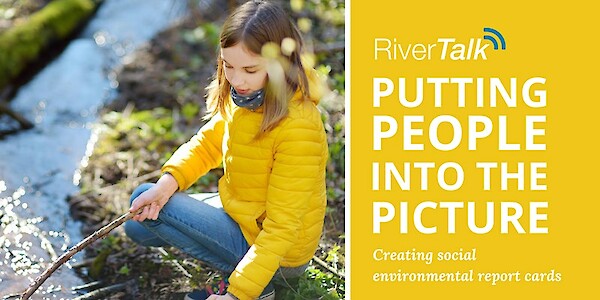
The International RiverFoundation's RiverTalk seminar series featured IAN's Dr. Vanessa Vargas-Nguyen on August 25. Vanessa's talk was titled "Putting People into the Picture: Creating social environmental report cards." She discussed the report card framework used by IAN as well as how report cards can benefit ecosystems and communities alike.
RiverTalk by Dr Vanessa Vargas-Nguyen

The International RiverFoundation's RiverTalk seminar series will feature IAN's Dr. Vanessa Vargas-Nguyen on August 25. Vanessa's talk is titled "Putting People into the Picture: Creating social environmental report cards." She will discuss the report card framework used by IAN as well as how report cards can benefit ecosystems and communities alike.
The COAST Card project received a virtual kick-off
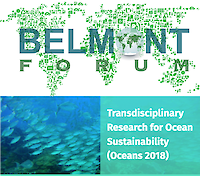
Bill Dennison and Vanessa Vargas-Nguyen attended the virtual kick-off meeting for the Belmont Forum projects funded under the Ocean Sustainability Collaborative Research Action (CRA) held on June 17–18. Their project, Coastal Ocean Assessment for Sustainability and Transformation (or COAST Card), is one of the thirteen international consortia of researchers and stakeholders awarded to conduct transdisciplinary research to innovate solutions for the sustainable use of oceans and minimize the effects of global change.
COMING SOON: online River Academy science communication training course

River Academy, the latest initiative from International River Foundation, is an interactive learning platform designed to teach anyone in river-related topics. Current course offerings include Leadership for River Practitioners, River Resilience, Science Communication, and River Restoration - Form and Function. IAN is developing the introductory course in Science Communication, which will cover topics ranging from storytelling strategies, to color theory, to data visualization. Upon completing a course with River Academy, participants will be issued a digital badge to showcase on their CV/resume.
IAN's staff continues to grow and evolve

IAN graduate student Vanessa Vargas-Nguyen was conferred with the first Ph.D. under the Environment and Society foundation of MEES during the virtual UMCES commencement ceremony. She is now a science integrator at IAN and will spearhead the upcoming COAST Card project. Science communication intern Annie Carew is joining IAN staff as a science communicator. She graduated from UMCES last year. IAN's program manager Alexandra Fries was promoted to FRA3. She was also nominated as the FRA representative to the UMCES faculty senate.
Developing new international report cards
Bill Dennison and Vanessa Vargas-Nguyen will be leading an international collaboration to develop innovative report cards for iconic embayments around the world. The four-year project, called "COAST Card," will develop report cards in Chesapeake, Manila, and Tokyo Bays as well as the Goa coast of India. This project is funded through the Belmont Forum, an international partnership that mobilizes funding of environmental change research from over two dozen counties in an effort to remove critical barriers to sustainability.
Developing new international report cards
Bill Dennison and Vanessa Vargas-Nguyen will be leading an international collaboration to develop innovative report cards for iconic embayments around the world. The four-year project, called "COAST Card," will develop report cards in Chesapeake, Manila, and Tokyo Bays as well as the Goa coast of India. This project is funded through the Belmont Forum, an international partnership that mobilizes funding of environmental change research from over two dozen counties in an effort to remove critical barriers to sustainability.
Revamping the Chesapeake Bay Report Card
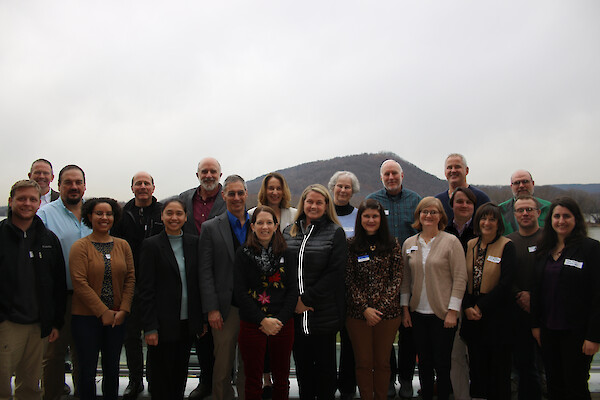
From January 7–8, IAN staff traveled to Harrisburg, PA for a workshop to expand the Chesapeake Bay Report Card. Bill, Caroline, Alex, Sky, and Vanessa facilitated and presented at the workshop. The workshop brought together stakeholders to discuss how to include watershed and socioeconomic data in future report cards. Watershed reporting regions were developed and numerous new indicators were discussed. Moving forward, there will be another workshop held in Virginia this spring to further refine the indicators and data analysis methodology.
Subscribe to the COAST Card Research Consortium newsletter
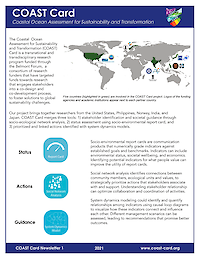
The Coastal Ocean Assessment for Sustainability and Transformation (COAST) Card is an international, transdisciplinary research program seeking to foster solutions to global sustainability challenges. This project brings together researchers from the USA, Japan, Philippines, Norway, and India. COAST Card merges three tools: socio-ecological network analyses; socio-environmental report cards; and system dynamics models. You can subscribe to the COAST Card e-news for updates. Follow COAST card on Twitter, Instagram, and LinkedIn.
Professional Certificate in Environmental Management for Sustainability courses
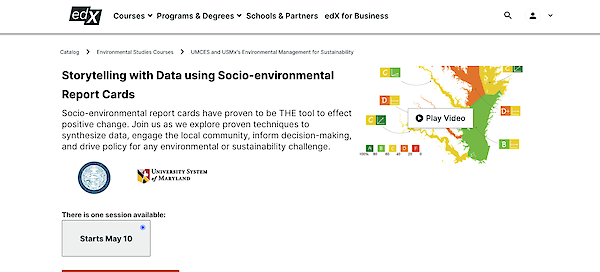
We are excited to announce that our Storytelling with Data Using Socio-environmental Report Cards course will be live this upcoming Monday, May 10th! This is our second course in the Professional Certificate in Environmental Management for Sustainability. Pro tip: consider enrolling as a verified learner to have access to bonus materials and extra resources.
Socio-environmental report cards have proven to be THE tool to effect positive change. Enroll here today, and join us as we explore proven techniques to synthesize data, engage the local community, inform decision-making, and drive policy for any environmental or sustainability challenge.
Subscribe to the COAST Card Research Consortium newsletter

The Coastal Ocean Assessment for Sustainability and Transformation (COAST) Card is an international, transdisciplinary research program seeking to foster solutions to global sustainability challenges. This project brings together researchers from the USA, Japan, Philippines, Norway, and India. COAST Card merges three tools: socio-ecological network analyses; socio-environmental report cards; and system dynamics models. You can subscribe to the COAST Card e-news for updates. Follow COAST card on Twitter, Instagram, and LinkedIn.
Developing a framework for an Environmental Justice Index in the Chesapeake Bay Watershed

Environmental justice requires providing fair treatment and meaningful involvement of all people, regardless of race, color, national origin, or income, with respect to the environment. The Marine, Estuarine, & Environmental Science graduate program within the University System of Maryland sponsors a suite of unique Issue Study Group courses in which students, faculty, and staff from a variety of campuses collaborate to develop tangible products. This newsletter summarizes the findings of a course entitled “Developing an Environmental Justice Index for the Chesapeake Bay Watershed Report Card,” conducted in spring 2021. In addition to this newsletter, blog posts were written and a video was produced.
New online course available

The next course in our partnership with the EdX online platform is now available! "The Science Advisory Toolbox for Environmental Management" has free registration, with an optional upgrade to receive a professional certificate at the end of the series.
There is a broad spectrum of ways that science can be incorporated into environmental management and policy and it all begins with effectively articulating cause and impacts. We will begin this course with a survey of early conservation thought-leaders that changed the conversation about how humans view their natural world. As our understanding of our natural world has grown in depth and complexity, so has the need for implementing new communication tools to best express this knowledge in a way that is accessible and actionable. Synthesis of data into a compelling story is the solution. You will develop your own toolbox of science advisory techniques while growing your environmental management knowledge base.
Taught by leading experts in the field with real world examples and studies, this course will show you how today’s conservation leaders can still “change the conversation” and guide society toward solutions for complex resiliency and sustainability problems that benefit all stakeholders and future generations.
Online professional certificate in environmental management for sustainability

This year, we launched our first professional certificate program in Environmental Management for Sustainability on EdX, an online learning platform for open online courses. All four courses are self-paced and available in five languages (English, Spanish, Filipino, Japanese, and Hindi). A professional certificate is available for verified learners, and all content is available for free. For more information, visit our certificate page on EdX.
Tropical scorecard in central Philippines
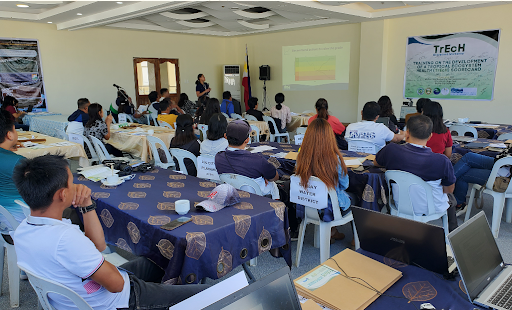
At the end of February, Dr. Vanessa Vargas-Nguyen traveled to the Eastern Visayas region of central Philippines to help facilitate a training workshop on the Development of a Tropical Ecosystem Health (TrEcH) scorecard for the Pagbanganan River in Baybay, Leyte. The TrEcH project is funded through the internationalization program of the Visayas State University in partnership with the University of Maryland Center for Environmental Science and the University of the Philippines. The workshop was attended by over 40 officials from various barangays (villages) and government agencies in the region. At the end of the workshop, participants identified values and threats of the river basin, potential indicators that can be used in the report card, and other stakeholders that needed to be included in the process. The participants and organizers also expressed their commitment to the success of the project and to continue the collaboration.
Congratulations, Bill!
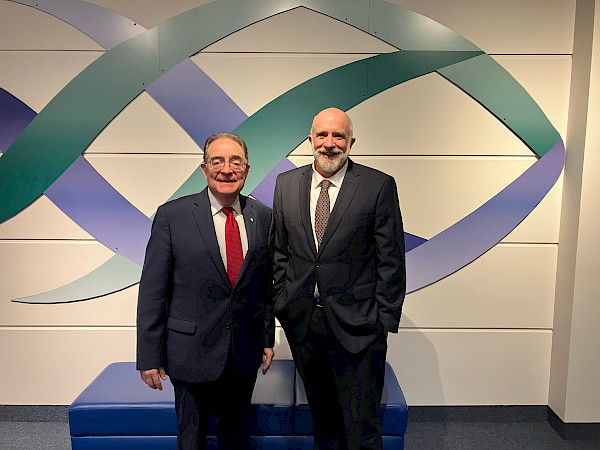
Congratulations to our very own Dr. Bill Dennison for being chosen as the Interim President of the University of Maryland Center for Environmental Science. Dr. Dennison, who has been an integral part of UMCES for many years, will commence his new position on September 25th. With decades of valuable experience at UMCES, his expertise will prove to be an asset during this transitional phase. Dr. Dennison is passionate about advocating for the vision of a UMCES Collaboratory and we are excited to see the great progress he will make in his new role.
Coming Soon: 2022 Chesapeake Bay Report Card
We are getting ready to release our yearly Chesapeake Bay and Watershed Report Card on Tuesday, June 6th at the Washington Sailing Marina in Alexandria, VA. Please join us in person or through Facebook Live. We are eager to share new indicators, update the community on the current condition of the Bay and watershed, and hold a listening session with stakeholders following the release. In addition, we will be holding three more stakeholder listening sessions in June: on June 8th at the Leonardtown Wharf Park, St. Mary’s County, MD, on June 14th at the Potomac Science Center in Woodbridge, VA, and on June 21st at the Canal Place Heritage Park, Cumberland, MD.
Advancing the next generation report card for the Arkansas River and Red River Basins
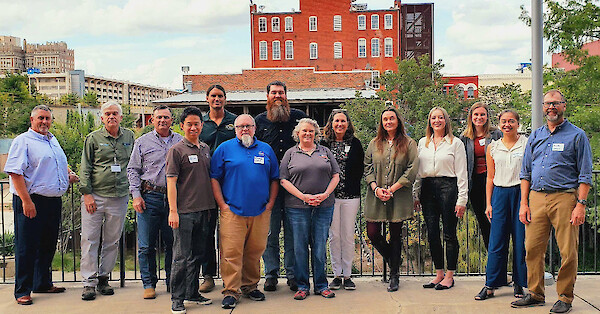
On September 11-14, Heath Kelsey and Vanessa Vargas-Nguyen, along with Kim Lutz of America’s Watershed Initiative, traveled to Oklahoma City to facilitate a stakeholder workshop addressing inland navigation, flow management, and flood control in the Arkansas-Red River Basin. It saw participation from stakeholders from diverse backgrounds and resulted in a shared vision for creating a sustainable, equitable, and resilient system. Key priorities that emerged from the workshop included data and communication, holistic management, ecological flows, natural systems, infrastructure, water quality, and funding. Proposed actions included advocating for funding, promoting coordination, educating the public, developing consensus-based solutions, and investing in climate adaptation. The workshop will act as a model for the advancement of the Mississippi River Watershed Report Card, focusing on specific goal areas and sub-basins, and generating an actionable plan that stakeholders can adopt.
Connecting with Susquehanna stakeholders at Bucknell University’s Annual River Symposium
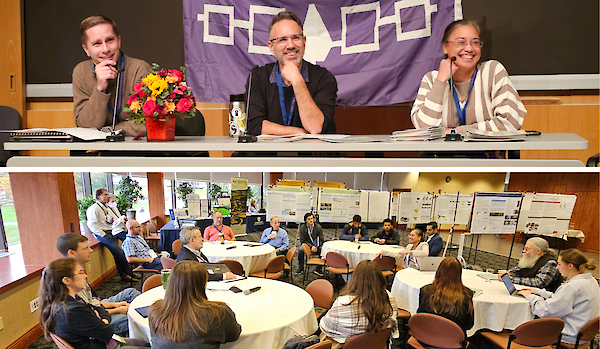
Vanessa Vargas-Nguyen delivered one of the plenary addresses at the 18th Annual River Symposium hosted by Bucknell University from November 3–4 in Lewisburg, Pennsylvania. This year’s theme is sustaining the river’s communities while maintaining the health of the Bay. Chief and Faithkeeper Oren Lyons of the Onondaga and Seneca Nations provided the indigenous perspective while the keynote was delivered by Denice Wardrop, Executive Director of the Chesapeake Research Consortium. The symposium provided an excellent opportunity to connect with and share the Chesapeake Bay and Watershed report card with stakeholders from the Susquehanna watershed. Additionally, Vanessa facilitated a breakout discussion on community engagement and participated in a panel discussion with John Clune of USGS and Harry Campbell of the Chesapeake Bay Foundation.
COAST Card team's Tokyo experience: Amamo2023 and J-COAST Conference insights

From November 17–22, the COAST Card team met in Tokyo, Japan for the Amamo2023 and J-COAST conference and meeting hosted at the Sasikawa Peace Foundation. While there, team members listened to and presented talks on seagrass, blue carbon, youth engagement, science communication, and the COAST Card Project. The conference highlighted the importance of empowering and engaging youth in restoration efforts. They visited various places around Tokyo that are of interest to the COAST Card Project or serve as sites of engagement and restoration events.
Learning about reef recovery and conservation practices in Ishigaki Island
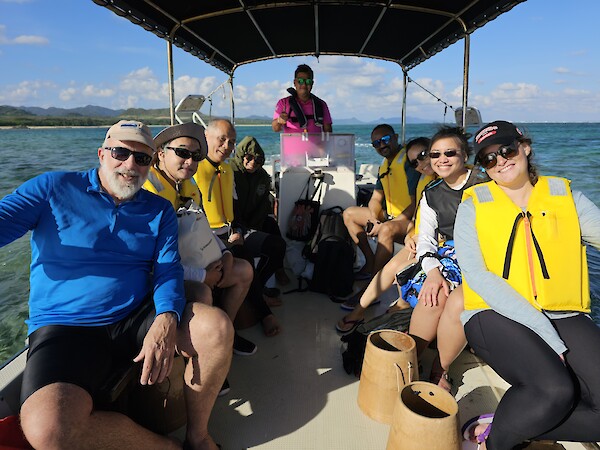
From November 22–24, the COAST Card partners visited the second Japanese study site, Ishigaki Island and Sekisei Lagoon. There, they visited multiple reef sites in different stages of recovery from bleaching events and saw the mitigation practices implemented by farmers to reduce agricultural runoff. They also met with different stakeholders from different sectors that are active in the protection and conservation of Ishigaki Island.
COAST Card Project Highlights
The Coastal Ocean Assessment for Sustainability and Transformation (COAST Card) project had an eventful year consisting of both local and international travel.
- Conference and workshop in Manila, Philippines
- Conference and workshop in Tokyo, Japan; site visits to Ishigaki Island and Sekisei Lagoon, Japan
- Stakeholder listening sessions in the Potomac Watershed, USA:
- Alexandria, VA
- Leonardtown, MD
- Woodbridge, VA
- Cumberland, MD
- Silver Spring, MD
The international conferences and workshops allowed project partners to meet in person, make progress on goals, and gain a deeper understanding of the different study sites. The five stakeholder listening sessions held across the Potomac Watershed in the summer, facilitated by our second cohort of Global Sustainability Scholars, provided important insights on values, threats, and visions related to the watershed.
Celebrating Earth Day at the University of Maryland Baltimore County (UMBC)
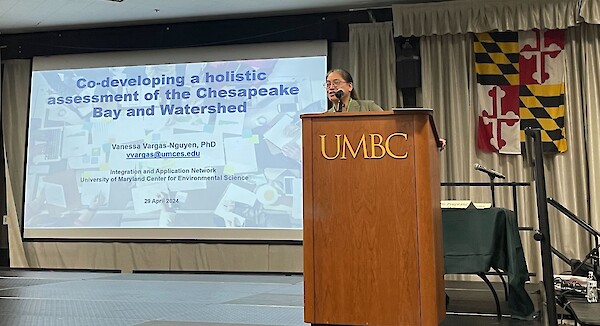
On April 29th, Vanessa Vargas-Nguyen was one of the featured speakers during UMBC’s 8th Annual Earth Day Symposium (EDS 2024). Supported by sponsorship from the UMBC Department of Physics and the Goddard Earth Sciences Technology and Research (GESTAR) II, the symposium serves as a platform for local Earth science research, fostering collaboration among UMBC and GESTAR-II researchers, graduate students, and other Earth science professionals. This year's symposium marked the culmination of a month-long series of activities, a collaborative effort between UMBC, the Environmental Protection Agency (EPA), and the United States Geological Survey (USGS). EDS 2024 featured five talks, a panel discussion focusing on the Role of PACE (Plankton, Aerosol, Cloud, and Ocean Ecosystem) mission in Monitoring Planetary Health, a nature walk, and a poster session highlighting graduate and undergraduate student research.
Congratulations, Pheng Lor!
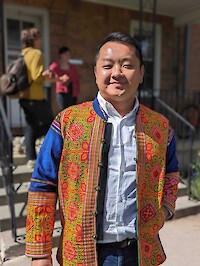
Pheng Lor successfully presented his Master's research project on April 22nd within the Environmental Humanities Program at the University of Utah. His research, titled "COAST Card: An Evaluation Case Study for International and Transdisciplinary Socio-Environmental Collaboration," includes survey data collected from listening sessions conducted in the Potomac River Watershed, USA and Manila Bay, Philippines, along with results from the Amamo2023 conference held in Tokyo, Japan. Additionally, Pheng shared insights from his formative evaluation of the COAST Card research consortium. As an alum of the Global Sustainability Fellows program, Pheng is an invaluable member of the COAST Card Team.
Thank you and farewell to our 2024 Global Sustainability Scholars!
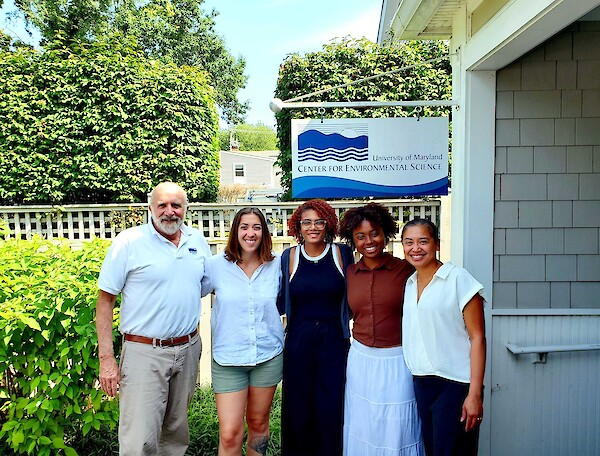
This summer, three Global Sustainability Scholars joined the COAST Card project: Kameryn Overton, Taylor Ouellette, and Bailee Porter. Kameryn worked closely with Veronica Lucchese and the Environmental Justice Journalism Initiative in their Reel Rewards Program and helped coordinate the Middle Branch Listening Session. Bailee conducted research to identify barriers to effective policy implementation, which will inform governance-related indicators for report cards in the Chesapeake Bay Watershed and the other COAST Card study sites. Taylor created a fantastic story map that describes and synthesizes the listening sessions conducted by IAN and facilitated with the GSS cohorts from 2022-2024. We are deeply grateful for their contributions and wish them all the best in their future endeavors!
Chesapeake Global Collaboratory: Baltimore in Context

On October 10th, the Chesapeake Global Collaboratory (CGC) hosted Baltimore Harbor in Context to explore CGC's role in restoring Baltimore Harbor. Eric Shott opened with a presentation on the harbor’s history as a key U.S. port, its industrial pollution, and recent remediation efforts that have improved water quality. This was followed by a panel with members of Blue Water Baltimore, the Environmental Justice Journalism Initiative, Council Fire, and Waterfront Partnership who shared their community-focused efforts to enhance the harbor. Linwood Pendleton from the Ocean Knowledge Action Network then delivered a presentation highlighting the importance of inclusive ocean sustainability strategies prioritizing initiatives led by Indigenous communities and local stakeholders. This inclusive approach was further reflected in a global panel featuring members from Ocean KAN, the COAST Card project, and the World Harbor Project. These experts from France, Japan, Norway, the Philippines, and the USA shared valuable insights on engagement strategies and practices that could help inform restoration efforts in the Baltimore Harbor. Additionally, two breakout discussions facilitated conversations on how the CGC can enhance partnerships for ongoing harbor restoration efforts, setting the stage for a broader Baltimore Harbor summit in 2025.
Fall 2024 MEES Colloquium
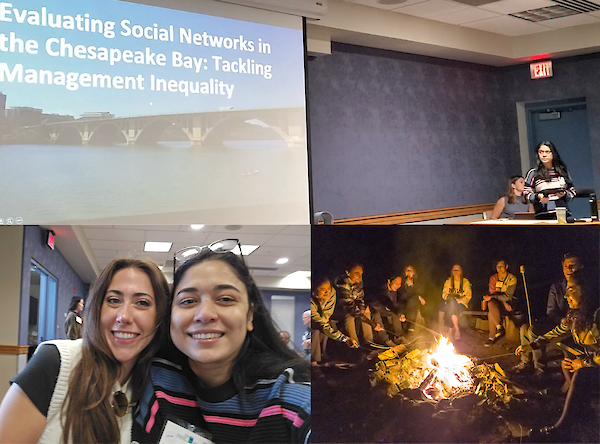
The Fall 2024 MEES Colloquium at the Horn Point Laboratory provided an excellent opportunity for research exchange and community-building within the MEES program. Attended by IAN graduate students Veronica Malabanan Lucchese and Anikka Fife, along with IAN UMCES faculty members, Director Heath Kelsey and Dr. Vanessa Vargas-Nguyen, the event featured a panel discussion, lightning talks, poster presentations, workshops, and various social activities, including a bonfire and field trips. Veronica delivered a lightning talk on her social network analysis of Chesapeake Bay Management and a poster highlighting her work with invasive species through EJJI’s Reel Rewards Program. This year’s colloquium allowed students and faculty to share their work, build networks, and engage in meaningful discussions.
Sharing Lessons to Advance Multidisciplinary Collaborations
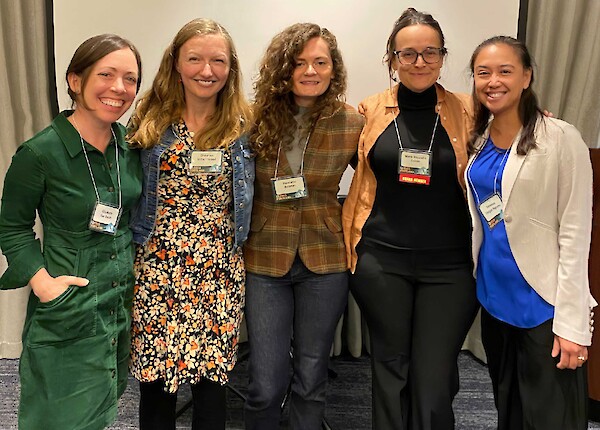
Vanessa Vargas-Nguyen participated in a panel at the 85th Annual Meeting of the Society for Applied Anthropology (SfAA) held in Portland, Oregon from March 25–29th. The session, Building and Sustaining Multidisciplinary Environmental Partnerships, brought together experts from government, academia, and NGOs to share strategies for advancing inclusive cross-sector collaborations that can address today’s most pressing environmental challenges. Vanessa shared insights from her work on transdisciplinary and transnational approaches to coastal sustainability, highlighting lessons from the COAST card project and emphasizing the importance of integrating local knowledge into environmental governance.